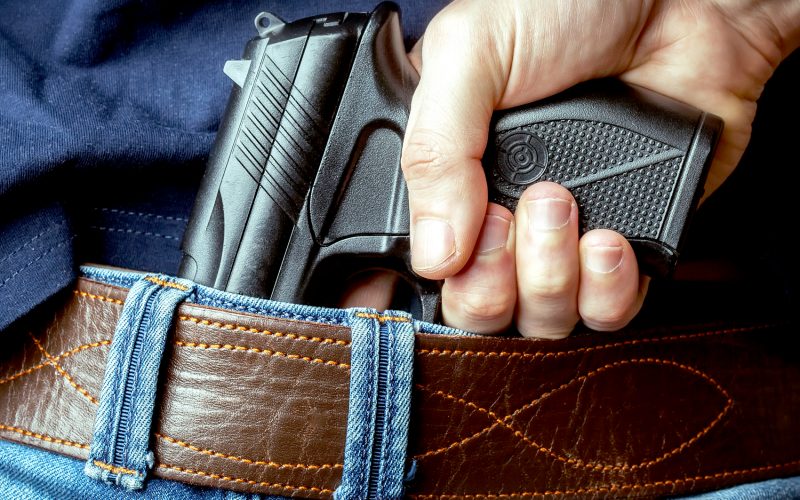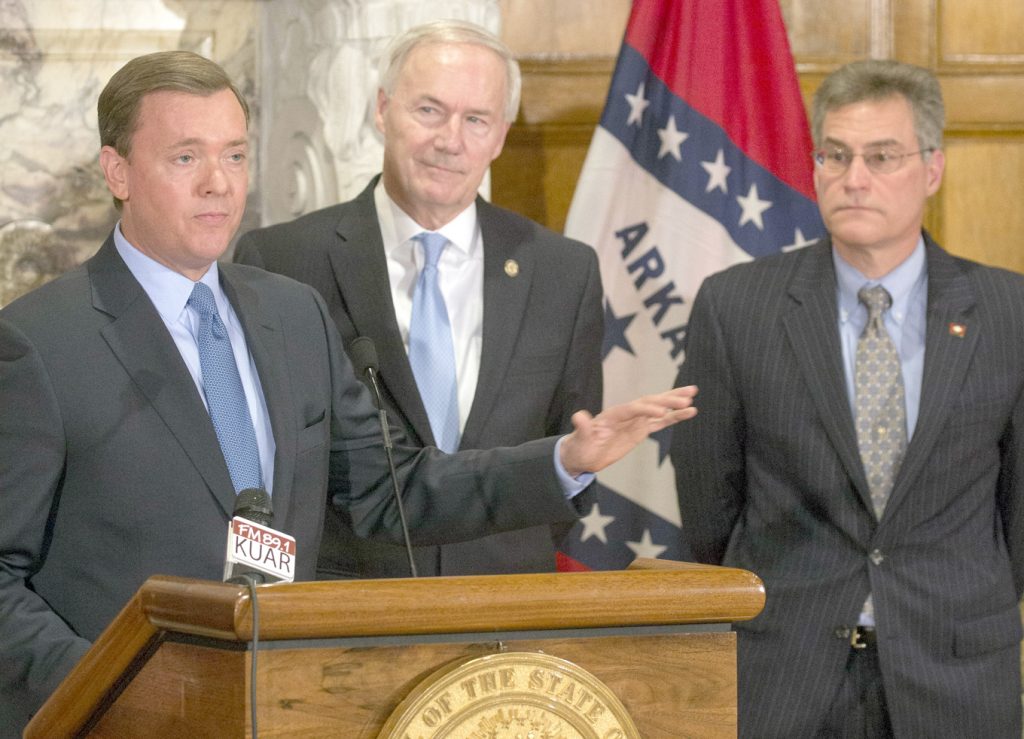- Arkansas Democrat-Gazette/BENJAMIN KRAIN –3/22/17– Gov. Asa Hutchinson, center, and Rep Charlie Collins, R-Fayetteville, right, listen to comments from NRA Institute for Legislative Action executive director Chris Cox, left, about the benifits of HB 1249 which Hutchinson signed into law Wednesday. The bill expands the places concealed-carry permit holders can take their guns in Arkansas.
A new law allows Arkansans to apply for enhanced permits to carry concealed handguns on college campuses, government buildings and bars, despite opposition from university leadership.
Gov. Asa Hutchinson signed HB 1249 into law March 23. The law allows an expansion to concealed carry permits that allows individuals with eight hours of active-shooter training to carry firearms on public colleges, government buildings and bars.
In order to receive an “enhanced permit”, the law mandates up to eight hours of active-shooter training for a person with a concealed handgun license who is 21 or older in order to carry a handgun on campuses, bars and government buildings. Prior to the new law, all such places had been restricted.
Private entities, such as churches and bars can opt out under the law, but are required to post signage stating they are a gun-free zone. Students who live on campus at public colleges also cannot store guns in their dorms. Guns are still not allowed in courtrooms either, which is a class D felony.
The NCAA Southeastern Conference (SEC) weighed in on the debate Tuesday, citing safety concerns during games with weapons present. SEC Commissioner Greg Sankey said the law could “negatively impact” scheduling, officiating, recruiting and attendance.
An amendment quickly followed by the state Senate that exempts guns from college sports events, and is expected to go before a House committee this week. The National Rifle Association, which has been a proponent for the new concealed carry law, opposes the amendment.
The new rules won’t go into place until Sept. 1, and the Arkansas State Police has until January 2018 to develop the training program for enhanced permits.
The controversial law originated with Arkansas Rep. Charlie Collins (R-Fayetteville), despite disapproval from Arkansas college leaders. A prior attempt by Collins to pass an expanded concealed carry law in 2013 had to be amended to allow colleges and universities the choice to opt out, which all did. Hutchinson previously stated that he was content with that version of the law.
“My goal has been to keep our loved ones safe on college campuses,” Collins said at the bill signing’s press conference. “What we’ve created here is a model which many other states will over time adopt.”
University of Arkansas Chancellor Joseph Steinmetz issued a condemning statement after the bill was originally filed in January.
“Our own law enforcement officers do not believe that the campus would be safer if guns are permitted,” his statement reads. “We have serious concerns about increasing the number of armed individuals posing a significant threat, particularly in an active situation when officers must make immediate determinations about who is a threat. Also, though not as important as the safety of campus, a campus carry bill has the potential to negatively affect the recruitment and retention of students, faculty and staff.”

Arkansas Democrat-Gazette/JEFF MITCHELL – 02/15/2016 – Rep. Charles Collins (L), R – District 84, presents HB1249 (AKA campus carry) as Sen. Trent Garner, R-District 27, looks onion the Senate Judiciary Committee, February 15, 2017. The bill passed out of committee.
Since the passing of the law, university officials said they will comply with state law enforcement to establish guidelines and policies.
“I’m convinced the public will be more safe, and we will have more safety in our institutions and our public spaces,” said Hutchinson, who once worked for the NRA as a consultant after the Sandy Hook school shooting.
Arkansas Moms Demand Action For Gun Sense in America, an anti-gun group, issued a statement condemning the bill last week from Austin Bailey.
“Being one of thousands of Arkansans fighting to stop this dangerous legislation has been an eye-opening experience,” her statement reads. “I’ve learned that our state legislators – and even our governor – listen to the gun lobby over their constituents and the people who will be directly affected by this legislation. That’s something we won’t soon forget. This legislation will make everyday life in Arkansas more dangerous. State legislators should know that passing this gun lobby priority will only motivate supporters of gun sense to get louder in Arkansas – our kids are at risk and we will not be silent while legislators gamble with their safety.”
Collins said the inspiration for the gun bill came from a study in the aftermath of the Columbine mass shooting from the Department of Education and the Secret Service. The study outlines the profile of the average active-shooter as a pre-meditated killers who plan their attacks to prey on the defenseless, which Collins believes can be countered by a “good guy or gal with a gun.”
“A Good Guy or Gal With A Gun”
Wanye LaPierre, executive director of the NRA, is a known proponent of the phrase, “the only thing that stops a bad guy with a gun is a good guy with a gun.”
Many gun-rights advocates argue gun-free zones only empower would-be killers, and gun control laws do nothing to stop mass shootings.
“Only criminals can find safety in gun-free zones,” said Chris W. Cox, executive director of NRA’s Institute for Legislative Action. “By allowing enhanced permit holders to carry in more places, Gov. Hutchinson has made Arkansas a safer place to live. This is an effort to remove roadblocks between law abiding people and their ability to exercise a fundamental right. We believe that if you have a legal right to be somewhere, and you’re a law-abiding person, you ought to have a legal right to defend yourself. … This is a step in the right direction toward that recognition. Is it a full recognition? No, but it’s a step in the right direction.”
However, some studies point to the contrary. About one in five active-shooter events get stopped by a potential victim at the scene, and most of those victims were unarmed, according to a 2014 FBI report.
The same study found about three percent of 160 active-shooter situations were deescalated by armed civilians, of whom four were on-duty security guards and one was a regular person, from 2000 to 2014.
No mass shooting has occurred on Arkansas college campuses to date.
Thirteen states currently allow concealed carry of a handgun without a permit.











